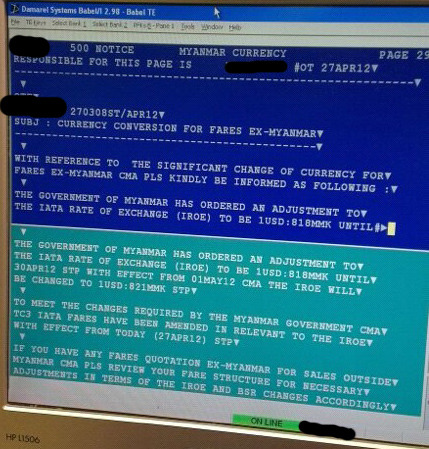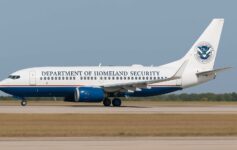The dust has now settled a bit in the latest airfare pricing extravaganza, but the fun has just begun. For those just joining the party, on Tuesday and Wednesday fares originating in Burma to just about anywhere in the world were bookable in economy, business and first class for a fraction of their average price thanks to a currency conversion snafu. Think $300 fares to Buenos Aires via Bangkok, Tokyo, and New York in first class.
The U.S. Dollar has been pegged to the Burmese Kyat for years at a government-imposed rate, but one of the many policy changes transforming Burma over the last few months has been a decision to let the Kyat float more freely against the dollar. Consequently, on 12 April the official rate was changed from 6.435 Kyatt to $1 to the “black market” rate of 818 Kyat to $1.
But that does not appear to be what caused the snafu. IATA was on top of it and while I know of a few people in Australia who took advantage of some good fares early on, fares originating in Burma were sold at the intended price for a couple weeks.
On 25 April, IATA issued this press release:
Intended Effective Date: 25 April 2012
Myanmar’s New Floating Exchange rate
IATA Rate of Exchange (IROE) for Myanmar Kyat (MMK) was amended to MMK818 for immediate effect by a memo circulated on 12 April due to Myanmar government and its Central Bank’s decision to float the exchange rate. The rate is intended to be effective until 30 April, and from 1 May [an] updated rate may be applied.
Due to the change to the IROE, and because there is no automated process to amend fare levels using new exchange rate, IATA fares from Myanmar were suspended and taken off system to protect consumer interests and member airlines revenue.
Because Tariff Conference action is required to re-establish IATA fares from Myanmar, IATA convened a special online e-Tariff conference to re-establish IATA fares from Myanmar to the rest of TC3. Where Flex fares have been implemented, i.e. to Europe and to SWP, IATA will recalculate the fares.
IATA proposed to re-establish the IATA Fares from Myanmar to TC3 except South West Pacific using the following formula:
The last approved levels effective March 31, 2011 MMK levels are divided by former IROE 6.435. Resulting USD level is rounded up to the next higher one.
Such rounded amount is then multiplied by new IROE 818 to obtain thenew MMK fare that is also rounded up to the next higher unit of 1.
IATA proposal was adopted by the Conference using the e-Tariffs platform.
Note that IATA mentions a new exchange rate may apply on 01 May, which happened to be the date this latest fare sale became available. This is no coincidence. Something happened between April and May that essentially caused fare prices to reset.
If the exchange rate had simply reverted back to the old 6.435 to 1 ratio, I would have expected fares to go up not down. After all, if fares were priced envisioning a 818 to 1 exchange rate and the Kyat suddenly strengthened by so many magnitudes, we’d presumably see fare skyrocket as well. Instead of $12,000 business class tickets we’d be looking at $1,636,000 for the same ticket. But the opposite occurred.
That leads me to hypothesize that fares prices, rather than the currency reset. Fares can be filed for any length of time and what may have happened here was that when the clock struck midnight on 01 May, the old pre-Kyat devaluation fares were restored, meaning fares envisioned at a 6.435 to 1 exchange rate were now available for a 818 to 1 rate. The result was a boon for consumers and what will not doubt be a royal headache for IATA, the many airlines involved, as well as the handful of online travel agencies including Vayama, Opodo, and Travelocity that offered this fare for purchase.
There could be another explanation as well–a human error in inputting a currency conversion rate. Take a look at this picture:

Note the new rate of 821 to 1 effective 01 May. What if IATA simply placed a decimal point in the wrong place, say 8210.0 to 1 instead of 821.00 to 1? Suddenly a $12,000 fare drops to $120…
* * *
I am working on a research paper on errors in airline ticket pricing that I hope to publish, but have essentially stopped my work for the time being while I wait to see how this latest incident unfolds.
Unlike past airline fare discrepancies, the FAA Modernization and Safety Improvement Act of 2012 is now in effect. Among its provisions is this little dandy in §399.88(a), summarized by the DOT below (pay particular note what I have italicized):
Does the prohibition on post-purchase price increases in section 399.88(a) apply in the situation where a carrier mistakenly offers an airfare due to a computer problem or human error and a consumer purchases the ticket at that fare before the carrier is able to fix the mistake?
Section 399.88(a) states that it is an unfair and deceptive practice for any seller of scheduled air transportation within, to, or from the United States, or of a tour or tour component that includes scheduled air transportation within, to, or from the United States, to increase the price of that air transportation to a consumer after the air transportation has been purchased by the consumer, except in the case of a government-imposed tax or fee and only if the passenger is advised of a possible increase before purchasing a ticket. A purchase occurs when the full amount agreed upon has been paid by the consumer. Therefore, if a consumer purchases a fare and that consumer receives confirmation (such as a confirmation email and/or the purchase appears on their credit card statement or online account summary) of their purchase, then the seller of air transportation cannot increase the price of that air transportation to that consumer, even when the fare is a “mistake.”
A contract of carriage provision that reserves the right to cancel such ticketed purchases or reserves the right to raise the fare cannot legalize the practice described above. The Enforcement Office would consider any contract of carriage provision that attempts to relieve a carrier of the prohibition against post-purchase price increase to be an unfair and deceptive practice in violation of 49 U.S.C. § 41712.
To sum it up, airlines are no longer allowed to cancel so-called mistake fares in the United States. Period. And to rub salt in the airlines’ wound, this rule kicks in not only after ticketing, but after a reservation is confirmed (which occurs immediately upon booking and often hours before ticketing occurs). This rule covers all airlines availing themselves to the U.S. market, not merely U.S.-based carriers. Every ticket booked under this latest sale may have to be honored.
Before all of you start jumping for joy who got in on this deal (and I bought four tickets myself), I must express that this still may be an uphill battle for consumers. This is very recent legislation and airlines will likely fight it in court. I think the the Commerce Clause clearly gives Congress the power to regulate matters such as this and therefore makes resolution of this case very easy, but that will be for courts to determine.
This new regulation does controvert decades of case law suggesting that a contract may be invalidated if entered in bad faith or without mutual assent. Those elements are arguably present in many fare sales and particularly this one. I maintain, though, that even the most business-friendly courts will be forced to side with consumers on this issue thanks to the new DOT regulation. And there is good reason for this.
Many have already found their reservations cancelled, so this could become very messy, very quick if the DOT starts fining offending airlines like Korean Airlines for non-compliance of the new directive. I am no fan of Korean Airlines and want to bring to your attention something they have done over the last two days that is pretty clever, though downright shady.
Rather than cancelling tickets themselves (they have no doubt read about the new Congressional law), they have instructed online booking sites like Opodo and Vayama to cancel all tickets purchased, stating that the tickets were priced incorrectly. Both sites have complied. Does that mean Korean Air is off the hook?
They can argue, after all, that they never cancelled any fare–it was the travel agent who did. Should that happen, we will no doubt witness a fiery lawsuit between these online travel agencies and Korean Airlines.
This is history in the making, folks, and I am happy to be part of it!




Korean Air was currently in a recent class action lawsuit for price-fixing along with Asiana. They sure love lawsuits!
Many thanks to the FTer that posted the DOT FAQs in the thread. Game changer!
Sad I had to cancel mine 🙁
Good luck!
“I maintain, though, that even the most business-friendly courts will be forced to side with consumers on this issue thanks to the new DOT regulation”
Well, the DOT doesn’t have to fine any airlines or any travel agency, to begin with. And they may not, under the circumstances. The main purpose behind the regulation wasn’t to protect people who took advantage of blatant mistake fares. Even if the DOT did fine, it’s going to be a fine between the DOT and the airlines and I doubt the consumers will see anything come of it; the DOT probably does not have the power to make the airlines reinstate the tickets or make the airline pay anything to the consumer.
The DOT regulation can present problems for people trying to go after the airlines and the travel agencies who canceled the ticket in state court because the airlines can point to this regulation and say, look, the DOT/FAA already has a specific regulation covering this, so your state consumer laws don’t apply;they’re preempted, and if the consumers have a problem, the DOT is the one to solve it, not private lawsuits. Clearly regulating airlines is and has been more at the federal level than the state level.
That regulation can hurt people’s chances of getting awarded damages.
@Ann: Thanks for your insightful comments–very interesting!
I think you make a good point about the downside to regulation (preemption) and indeed, the DOT could say that they choose not to act, as only they can hover these $27,000 fines over airlines.
But two points. First, this wasn’t a mistake fare per se, it was a currency problem, but we saw people booking tickets through Air Canada, Korean, Singapore, Air India, and Delta (among others). That is not the sign of an error. Second, based on the FAQ I posted above, the DOT is not interested whether an airline claims an “mistake fare” or not–rather, they are focused on whether a confirmation e-mail was sent. Period. Judging by new clear language by the DOT, I think they will not be happy at all with what some of the airlines have done.
Ann,
With the ROR deal there was a notion of making consumers whole. So I think the DOT can do more than fine the airlines. They will not go into individual cases, but they can certainly flex their muscle if they want.
I am sure airlines at this moment are talking with DOT, especially KE.
Does a purchase occur with United (the old CO website process) when you receive the
We are processing your reservation and will send you an e-ticket confirmation once this has been completed. Typically, this process takes less than an hour, however, in some rare cases it could take a couple days. Please be assured that your reservation will remain confirmed during this processing period, and there is no need to contact us unless you are traveling within 24 hours.
Email or when you receive the final email ticketing email?
I booked a domestic reservation (DEN-ORD-RDU-IAH-DEN) with 2 of the 4 segments in Y and listed as “Y-up. I received an email confirming the reservation but after two days, I still had not received the final ticketed & confirmed confirmation.
When I called UA, the agent informed me that the fare was a “mistake” and that the reservation wouldn’t be confirmed with the Y fare. He switched it to G and it booked the next day.
Do I have any recourse under the new law to get the Y-up fare back?
Thanks.
In my MANY talks with top people at the DoT during the AA HKG fare matter last year, they made it VERY clear that they are NOT around to make RULINGS…only RULES. They WELCOME consumers filing suit, as they have their hands tied on most things. They are not going to ‘rule for the airline’. They may not be willing to FINE the airlines involved, but they wont rule FOR them.
Matt, do you have a link to where you found the press release? i am looking on the IATA website under press releases and it is not there.
Any help would be greatly appreciated!